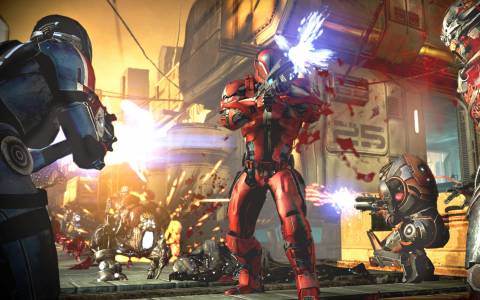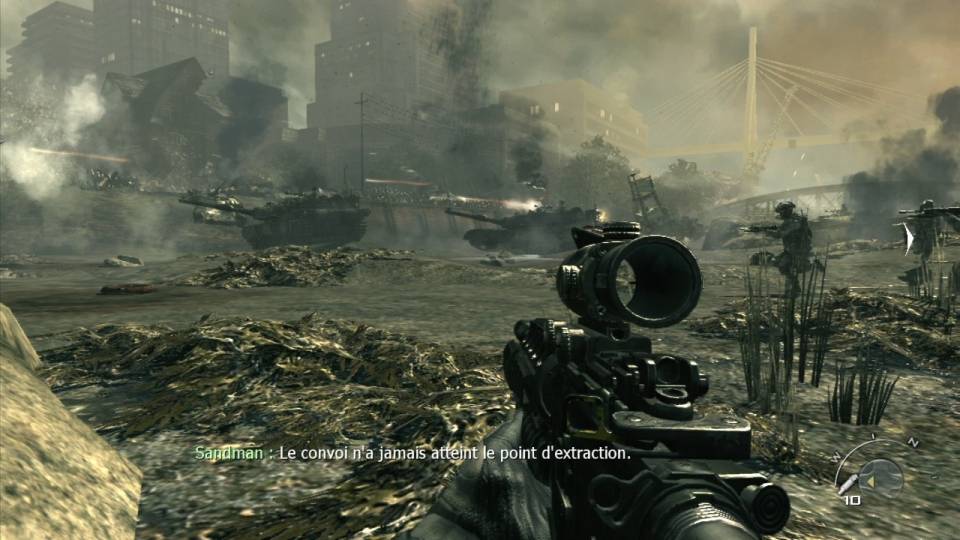
When Simon Parkin published his review of Uncharted 3: Drake’s Deception at Eurogamer, a mild firestorm erupted, launching a contentious debate about the role of criticism during the review process.
Parkin’s review took issue with the Uncharted design philosophy as a whole, but still awarded the game an 8/10 at the bottom of the page--a respectable score from an outlet as tough as Eurogamer!

Fans, developers, and even some writers wondered aloud whether Parkin had picked the appropriate venue for his examination of Naughty Dog’s choices. I wrote my own piece about the ensuing response, which prompted a more intimate conversation about the subject with game developer Manveer Heir, who is currently a senior designer on Mass Effect 3 at BioWare Montreal.
Heir has been kicking around the industry for a while now, having landed at BioWare Montreal and the Mass Effect series after five years with Raven Software in Wisconsin, the home state of my dearest football rivals. Heir is known for his outspoken nature, and isn’t one to walk away from a controversial subject. In fact, it was Heir that proposed we start a back-and-forth letter series about game reviews and publish it.
I suggested we throw it up on Giant Bomb in its entirety, and he agreed.
If you’re not familiar with Heir, you can read his dusty blog Design Rampage (which he promises to update), follow him on Twitter, scope this Kill Screen interview about his early years, or load up a Gamasutra interview about race.
Take it away, Manveer.
Note: This exchange took place over email, and I've done minimal editing to reflect the casual style.
--
Patrick,

Thanks for agreeing to discuss the role of game criticism and reviews with me. It's something that has been bothering me for some time now, and I wanted to discuss it with someone who works in the field, instead of just talking to other people like myself who often bitch on Twitter. So you know where I'm coming from, I'll give you a brief background about myself before I became a game developer. I used to cover the news, write previews, reviews, and do interviews for the enthusiast press (what is now known as bloggers) for a couple sites when I was in high school and early college (late 90s, early 2000s). It was a means to an end to get connected to the game development community, instead of wanting to be a journalist, but hey, it worked. More specifically, I don't think I was particularly good at my job. I judged games on 100-point scales that broke scores down into component parts like graphics, sound, etc. (something I find abhorrent now in my life). I say this so you understand that I've actually done the job (to a novice extent) for over five years, and so I understand some of the pressures reviewers are under in today's climate, as well as how the job goes.
My issues currently stem from games criticism and games reviewing, and should they even be the same thing. I am of the mind that they should not, and here's why. I should explicitly note that all my opinions are my own and not my employer's. Games criticism is new, it's in its infancy, and it's growing with every day. Game reviews, on the other hand, have been consumed for a very long time. As a developer, I love game criticism. I love reading my issues of Kill Screen, I love reading how someone finds a game sexist or offensive due to certain elements that are engrained in our culture, when we never stop to sit and think WHY they are engrained. I love all of that, I want more criticism. As a developer, I thrive and grow off criticism. I need it from my peers and those outside to better my own sensibilities, lest my colleagues and I rest on our collective laurels in the future.
But when we give those criticisms a score, we do something else. We make the criticism the focus of the entire product. To use specific examples, let's look at Simon Parkin's Eurogamer review of Uncharted 3: Drake's Deception. Parkin is an author I greatly respect and someone whose work as a critic I find to be on point often times, and his review is recent, which is why I cite it. In his review he states "Uncharted 3 is the most exciting game in the world, but only until you deviate from the script." He goes on to expand on how the game makes you feel like nothing more than an "interactive butler" at times.
Now, this is a criticism of how linear the game is. Like Uncharted 2, Uncharted 3 is very linear. In fact, like Modern Warfare 2, it is very linear. Like Gears of War 3, it is very linear. Like countless other 90+ rated titles, it is very linear. Many blockbuster games that are coming out are very linear. This is the choice they have made. All of them have this problem. The issue I have isn't with this criticism, but rather the calling out of this criticism on Uncharted 3 as a reason for a rating. Because, if that's the case, then shouldn't Modern Warfare 2 have similar criticisms embedded in it and review score docked accordingly? Yet a review of that game by Parkin doesn't mention, in-depth, the linearity issues like it does with Uncharted 3.

The issue does not lie with the criticism. The issue lies with what the game is. I do not judge a pie poorly because it is not cake. Both are delicious desserts, and there is a time and a place for both (the place, specifically, is in my belly). So when talking about player agency regarding linear vs. open-world games, I find these to be drastically different styles that are like comparing pies to cakes. I have a strong preference to see more player agency, and I, too, get frustrated when it is stripped away from me in games. But how do we reconcile this when all of our games that are linear have the same base problem? Do they all just get judged down a point because they are linear? Do we make sure all reviewers from a publication know that when they have different reviewers judge a game?
It seems difficult to handle things this way. I think making pointed criticisms about Uncharted 3's linearity, and then potentially tying it in into the entire industry's reliance on scripted narrative, Parkin could have made a wonderful piece that wasn't overshadowed by the 8/10 score he gave that sent fans into an uproar. The existence of the score took the piece away from criticism of the work and into a review of the work, and sadly, to me, it took away Parkin's ability to actually make a wonderful point because people got too up in arms about a number. To me, a review serves a different purpose. Criticism exists absolutely. Reviews exist relatively. What I mean is, I don't rate Iron Man the movie the same way I may rate Crash. However, if you asked me what I thought of both pieces I would say, in a word, "must see." But clearly their goals are different; one is a well-done piece of Hollywood blockbuster and the other is a poignant piece about race relations in contemporary society. Sometimes I'm in the mood for Iron Man. Sometimes I'm in the mood for Crash. Sometimes I'm in the mood for pie. Ok, I'm almost always in the mood for pie. But I think you get the point.
Shouldn't we then review our games in the same light? Shouldn't a game that is trying to be a linear piece of Hollywood blockbuster be rated against how those types of games typically play and the expectation of the audience? Shouldn't a review tell me if this piece of work is worth my time or not? Is that not a different question than "does this piece of work have flaws"? Trying to relate Uncharted 2 to something like Dark Souls is very hard to do, and I think we go down a bad path when we try to do it.
Let's keep criticizing games. Let's do it louder than ever. The development community needs it! But let's not mix our critique with our reviews. To me one is about recommendations to an audience, and the other is about the state of the art. The latter is far more useful than the former in my world. I'm all for the abolishment of reviews, but I think sites like yours may take a readership hit if that happens. So, without that happening, I think we should separate the two. Am I crazy? Do I have the wrong expectations for what the function of the two are? Or are my opinions just colored too darkly from my life as a developer who has to live with the score of reviews? Let me know your thoughts.
Sincerely,
Manveer
--
Manveer,

One of the things I love about the video games industry is our collective commitment to self-reflection, a willingness to open ourselves up in the pursuit of becoming better players, creators or writers. In my case, I'm a journalist first and a critic second, a path I started walking down in high school, when an English teacher suggested the best way to ensure I could make a buck putting words on a page was journalism. I'd been writing about video games earlier than that, however, having attended my first E3 back in 1998. If memory serves me right, I was 14 back then, and I've been writing about games in some form since then, attending college for print journalism and rotating between news posts at various outlets.
And while reporting is my daily bread and butter, I'm also a reviewer, having recently endured the trial-by-fire that was reviewing a new Zelda game--The Legend of Zelda: Skyward Sword. My experience giving the latest Zelda a less-than-perfect score fits right in to this conversation, as it was the first review I'd written after reading Simon's review of Uncharted 3 and writing a follow-up editorial that criticized the hyperbolic response from fans.
Before I launch into my own process, perhaps we should back up and examine the purpose of a review. Until only recently, reviews have had more in common with what you'd read in Consumer Reports than a serious critical analysis, an attempt to explain what a game is, isn't and whether it's worth spending any money on. That alone is useful to a great many people, and part of the reason reviews are so important to video games in particular is because, individually, they cost more money than other mediums. You don't feel as burned about wasting $10 on the latest bucket of CGI from Michael Bay compared to shelling out $60 at GameStop, realizing the marketing mislead you, and having nothing but a set of achievements to show for it. There is a very real, important role for reviews that intends to accomplish no more than answering the question of yes or no.
But is that all we should expect from our reviews? Often times, we already know if we're going to buy a game or not, and a review is just a way to read about the game in some opinionated specificity before the game unlocks on Steam. For that audience, of which I'd argue there's a very large one visiting most enthusiast publications, a typical review doesn't provide any real service. As publications evolve, game companies have only themselves to blame for the predicament we're now in. Metacritic has its own issues, but the importance publishers have placed upon Metacritic is the bigger problem, and it's clear publications are beginning to understand the power of Metacritic to varying degrees. For some, it's a recognition that reviews may not impact video game sales in any meaningful way, but the reviews (and the scores attached) are, in fact, meaningful, as publishers have made them important, and the words that appear in those reviews suddenly take on a different weight.

I don't want this to become yet another conversation about Metacritic, as it's only part of the issue, and the evolution of the review seems more encouraged by the homogeneous nature of so many of them. Unless I'm seeking out the opinions of a specific author, I'm not interested in reading a dozen glowing reviews of The Elder Scrolls V: Skyrim. I want to read the review from the one guy that fucking hated it, the guy who wants to make the argument about why it's actually terrible. Maybe I don't end up agreeing with this hypothetical guy, but I don't need my opinions validated, I need my opinions challenged.
You do point to one real problem with game reviews that publications deal with in different ways. Edge does not specify who actually reviewed a game. Edge is known for being tough, so when Edge proclaims your game is worthy of a 10 (which, for the record, does not mean perfect!), that actually means something. Most publications, however, have a byline in the review, and when it comes to games that don't receive 10/10 or 5/5, the comparative analysis begins. "Well," so the argument goes, "they gave Skyward Sword and Fruit Ninja Kinect a 4/5, so they're both of equal quality." This isn't fair to either game or the reviewer. I'm not of the mind a publication should find itself beholden to making sure its reviews are wholly consistent against everything that has come before it, as games are good, bad and weird for entirely individual reasons that aren't comparable.

And here's how I'll circle back to my Skyward Sword review. The Zelda series has existed for more than 20 years, essentially becoming a genre unto itself. This happens to many longtime franchises, and it's happening before our eyes with Call of Duty. The reviews for Modern Warfare 3 almost universally ding the game for being more of the game, but the game's sales suggest that doesn't mean very much to the fans--they want more of the same. The struggle for the reviewer, then, is the audience he's writing to. Haven't most Call of Duty fans made up their mind about whether they are buying the new Call of Duty? Is there anyone who is really "on the fence" about buying Modern Warfare 3? Knowing that, a review that's targeted directly at Call of Duty fans isn't much use to anybody at all, and launching into a larger criticism of this subgenre could be useful to someone like myself, who isn't really interested in yet another on-rails shooter. Parkin didn't review Modern Warfare 3, so we can't predict what he would have said about that one, but the Uncharted series falls into the same boat, and writing 1,000 words about how "Did you like Uncharted 2? Let me tell you why you would like Uncharted 3!" isn't much use, and a grand critique of the foundational philosophy of the series' game design is only possible with the perspective of three games.
With Skyward Sword, I found myself as someone who was no longer satisfied with many of the tropes that had come to define the Zelda series, even if Skyward Sword is a game that works within them very well. The review I wrote, if successful, will read like a five to someone who doesn't have the same hangups, but I'm not that person and I can't write a review for that person. I can only hope to string together a series of words and sentences that allow them to see why I came to my conclusion, and how they might draw another one. But writing a review of Skyward Sword that ignored everything around it would be purposeful ignorance, and a disservice to the same amount of lavish, immaculate detail Nintendo spent crafting the game.
The easy way out would be to drop scores, but let's not kid ourselves, as that won't happen. What's the middle ground?
Good luck finishing Mass Effect,
Patrick
Look for the next installment of our three-part conversation on Monday. Want more pieces like this? Let me know.
409 Comments